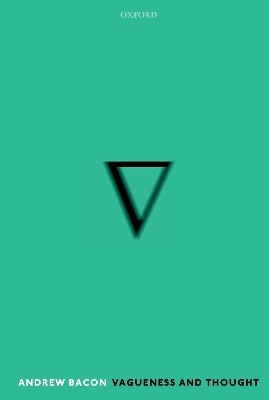
Vagueness and Thought
Oxford University Press (Verlag)
978-0-19-285608-1 (ISBN)
Vagueness is the study of concepts that admit borderline cases: the property of being bald is vague because there are people who are neither definitely bald, nor definitely not bald. The epistemology of vagueness concerns the sorts of attitudes we ought to have towards propositions we know to be borderline. Is it possible to discover whether a borderline bald man is bald? Could two people with access to the same facts reasonably disagree about whether he is bald? Does it matter, when making practical decisions, whether he is bald?
By drawing on such considerations, Andrew Bacon develops a novel theory of vagueness in which vagueness is fundamentally a property of propositions, and is explicated in terms of its role in thought. On this theory, language plays little role in explaining the central puzzles of vagueness.
Part I of the book outlines some of the central questions regarding the logic and epistemology of vagueness, and criticizes some extant approaches to them. Part II concerns issues in the epistemology of vagueness, touching on the ramifications of vague thoughts on the study of evidence, ignorance, desire, probability theory, and decision theory. By examining the effects of vague information on one's beliefs about the precise, a positive theory of vagueness is proposed. Part III concerns the logic of vagueness, including the interaction between vagueness and modality, vague identity, and the paradoxes of higher-order vagueness. Bacon suggests that some familiar philosophical notions -- including the concept of a fundamental proposition, a possible world and a precisification -- need to be revised.
Andrew Bacon is Assistant Professor of Philosophy at the University of Southern California. His work typically applies the methods of philosophical logic to issues in metaphysics, epistemology, and the philosophy of language. Recently he has worked on vagueness, the semantic paradoxes, and logic and epistemology of conditional statements.
Part I: Background
1: Non-Classical and Nihilistic Approaches
2: Classical Approaches: An Overview of the Current Debate
3: An Outline of a Theory of Propositional Vagueness
Part II: Epistemological Matters
4: Vagueness and Language
5: Vagueness and Ignorance
6: Vagueness and Evidence
7: Probabilism, Assertion and Higher-order Vagueness
8: Vagueness and Uncertainty
9: Vagueness and Decision
10: Vagueness and Desire
Part III: Logical Matters
11: Vague Propositions
12: Vagueness and Precision
13: Symmetry Semantics
14: Vagueness and the World
15: Vagueness and Modality
16: Vague Objects
17: Beyond Vagueness
18: Appendices
| Erscheinungsdatum | 27.06.2022 |
|---|---|
| Reihe/Serie | Oxford Philosophical Monographs |
| Verlagsort | Oxford |
| Sprache | englisch |
| Maße | 155 x 232 mm |
| Gewicht | 552 g |
| Themenwelt | Geisteswissenschaften ► Philosophie ► Erkenntnistheorie / Wissenschaftstheorie |
| Geisteswissenschaften ► Philosophie ► Logik | |
| Geisteswissenschaften ► Philosophie ► Metaphysik / Ontologie | |
| ISBN-10 | 0-19-285608-1 / 0192856081 |
| ISBN-13 | 978-0-19-285608-1 / 9780192856081 |
| Zustand | Neuware |
| Haben Sie eine Frage zum Produkt? |
aus dem Bereich


![Was heißt Denken?. Vorlesung Wintersemester 1951/52. [Was bedeutet das alles?] - Martin Heidegger](/media/113619842)